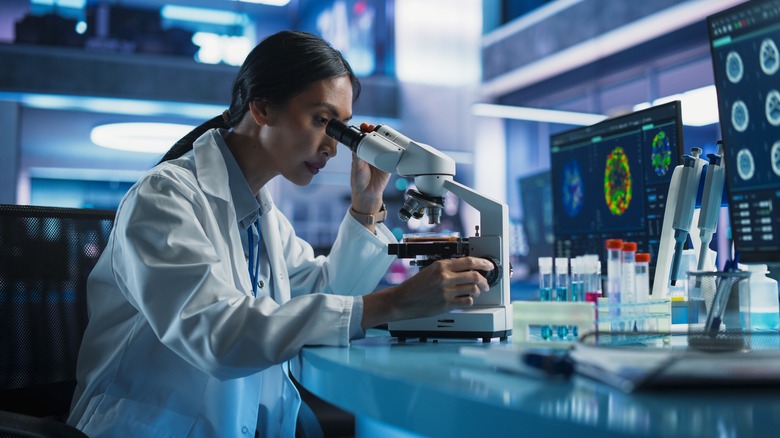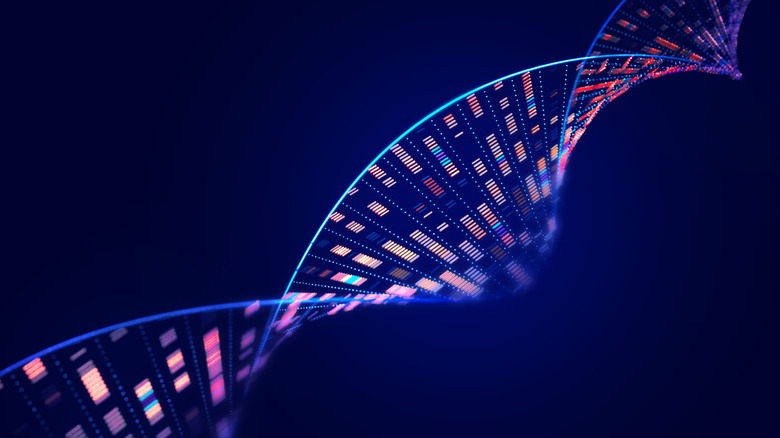How Short Trips To Space Can Alter An Astronaut's Biology
NASA conducts a lot of different tests both here on Earth and up in space. It's the main reason the International Space Station (ISS) was built. Such tests offer insight to the human body, specifically in a zero-gravity environment, while also supporting the advancement of technology. One study NASA conducted revealed long-term spaceflight's impact on human health, and research has also been conducted on short-term effects. This knowledge has grown increasingly important since space exploration is gradually becoming a private venture, with the likes of Blue Origin and SpaceX conducting missions beyond Earth's atmosphere.
Susan Bailey, Professor of Radiation Cancer Biology and Oncology at Colorado State University, conducted a study with the 2021 crew of SpaceX's Inspiration4 mission and wrote about it for The Conversation. She and her team specifically looked at the crew's telomeres — a part of DNA that's supposed to prevent the ends of chromosomes from being damaged. Bailey describes telomeres as "the plastic tip that keeps a shoelace from fraying." She found that the telomeres in all four members of the Inspiration4 team increased in length, and when they returned to Earth three days later, their telomeres shortened.
The same effect happened to Scott Kelly, who stayed on the ISS for a year while his identical twin remained on Earth as an experiment that looked at the effect space has on the human body. Seeing the same effect with Inspiration4, a considerably shorter mission, means this impact on DNA happens almost immediately.
Space can affect your DNA very quickly
Susan Bailey was part of the team that conducted NASA's twin study with astronaut Scott Kelly and his twin in 2015. Kelly stayed on the ISS for a whole year while his brother remained on Earth. A whole slew of studies were conducted on these two, but Bailey focused on Scott's blood samples from before, during, and after his time in space. The data showed that his telomeres elongated during this period. However, when he returned to the surface, they shortened considerably.
Bailey and fellow researcher Christopher Mason conducted a similar twin study on mountain climbers braving Mt. Everest, and the results were largely the same as the space study. Those who took part in the unforgiving climb saw notable telomere growth, which shortened again upon their descent. The climbers' twins stayed at significantly lower altitudes and didn't experience this extreme change in telomere length.
Another study followed a group of 10 astronauts scheduled over six months aboard the ISS. Bailey and her team paired them with a control group on Earth, matching sex and age. As expected, those who went to space experienced notably telomere shortening.
Why telomere length is so important
Telomeres naturally shorten throughout our lives. Stress, inflammation, and simply getting older causes them to get shorter. It goes further than that, though, as scientists have shown that other factors, such as pollution, smoking, and physical activity can affect the length of a person's telomeres. It's clear that people like astronauts and mountain climbers can accelerate telomere deterioration. While scientists know that telomere length can indicate a person's risk for diseases like cancer and dementia, there's a lot they still don't know.
The mountain climber study allowed Susan Bailey and her team to determine that it wasn't simply a lack of gravity that affected the length of these protective chromosomal caps. More likely, it's caused by radiation exposure, as astronauts aren't protected by Earth's atmosphere. The higher in altitude a person is, the more cosmic radiation they're exposed to. More research into this subject can better prepare the human body for space travel and the possible colonization of other planets.


